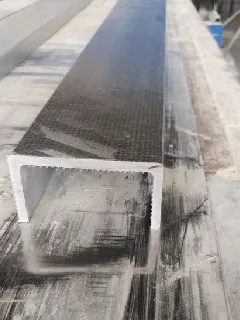loading...
- No. 9, Xingyuan South Street, Dongwaihuan Road, Zaoqiang County, Hengshui, Hebei, China
- admin@zjcomposites.com
- +86 15097380338
- Welcome to visit our website!
ro frp vessel
Understanding FRP Vessels A Comprehensive Overview
Fiber Reinforced Polymer (FRP) vessels have become integral components in various industries due to their unique properties, versatile applications, and significant advantages over traditional materials. These vessels, made of composite materials reinforced with fibers, typically exhibit remarkable strength, lightweight, corrosion resistance, and durability, making them ideal for a wide array of applications.
What are FRP Vessels?
FRP vessels are structures that utilize a composite material consisting of a polymer matrix reinforced with fibers, commonly glass, carbon, or aramid. The combination of these materials results in a product that not only withstands high stresses but also offers resistance to chemicals and environmental degradation. This makes FRP vessels particularly valuable in industries such as chemical processing, water treatment, and oil and gas.
Advantages of FRP Vessels
1. Corrosion Resistance One of the most significant advantages of FRP vessels is their exceptional resistance to corrosion. Unlike conventional vessels made of metal, which can corrode in harsh chemical environments, FRP materials stand up to acids, bases, and other aggressive substances without deteriorating. This property extends the lifespan of the vessels and reduces maintenance costs.
2. Lightweight FRP vessels are typically lighter than their metal counterparts. This reduction in weight can lead to easier handling, transportation, and installation. In applications such as offshore platforms or chemical plants, where weight can significantly impact structural support and operational efficiency, the lightweight nature of FRP can be a crucial factor.
3. Strength and Durability Despite their lightweight nature, FRP vessels have impressive strength. The inclusion of fibers, particularly glass or carbon, enhances the structural integrity of the vessels, allowing them to endure high pressures and extreme temperatures. This makes FRP an excellent choice for pressure vessels and containment structures.
4. Thermal Insulation FRP materials exhibit excellent thermal insulation properties, which is advantageous for applications where temperature control is critical. This characteristic helps maintain the integrity of the materials being stored or transported within the vessels, promoting efficiency and safety.
ro frp vessel

5. Design Flexibility The manufacturing processes for FRP vessels allow for considerable design flexibility. They can be molded into various shapes and sizes to meet specific operational requirements. This adaptability can provide solutions in highly customized applications, where standard metal vessels might not suffice.
Applications of FRP Vessels
FRP vessels are used in numerous sectors, including but not limited to
- Chemical Processing Due to their resistance to corrosive substances, FRP vessels are widely used in the storage and transportation of chemicals. They serve as tanks, pipes, and containers to hold hazardous materials.
- Water Treatment In the water treatment industry, FRP vessels play a crucial role in filtration systems, storage tanks, and pressure vessels. Their corrosion resistance ensures longevity in applications involving water purification and chemical dosing.
- Oil and Gas The oil and gas industry utilizes FRP vessels for their durability and certified safety in high-pressure environments. They are often used in offshore platforms and as containment vessels for various extraction and storage processes.
- Mining and Minerals FRP vessels are beneficial in the mining industry, primarily for storing corrosive materials and chemicals used in mineral extraction processes. Their durability ensures minimal downtime due to inefficiencies caused by vessel failure.
Conclusion
The proliferation of FRP vessels across various industries signifies a revolution in the design and manufacturing of containment solutions. Their unique characteristics provide an extensive range of advantages, from corrosion resistance to lightweight properties. As technology advances and the demand for durable, efficient, and economical solutions continues, FRP vessels are poised to play an even more vital role in shaping the future of many sectors. Embracing these innovative materials not only enhances safety and efficiency but also contributes to sustainability efforts by minimizing maintenance and extending lifecycles.
-
GRP Structures: The Future of Lightweight, High-Performance EngineeringNewsJun.20,2025
-
FRP Water Tank: High-Performance Storage for Corrosive and Clean Water SystemsNewsJun.20,2025
-
FRP Square Tube: The New Industry Standard for Chemical and Structural ApplicationsNewsJun.20,2025
-
FRP Pultruded Profiles: The Ultimate Choice for Lightweight Structural StrengthNewsJun.20,2025
-
FRP Handrails: The Safer, Smarter, and Stronger Choice for Modern InfrastructureNewsJun.20,2025
-
FRP Grating: The Smart Solution for Durable, Lightweight Industrial FlooringNewsJun.20,2025
-
Why Choose a Galvanized Water Tank for Your Storage NeedsNewsMay.21,2025
